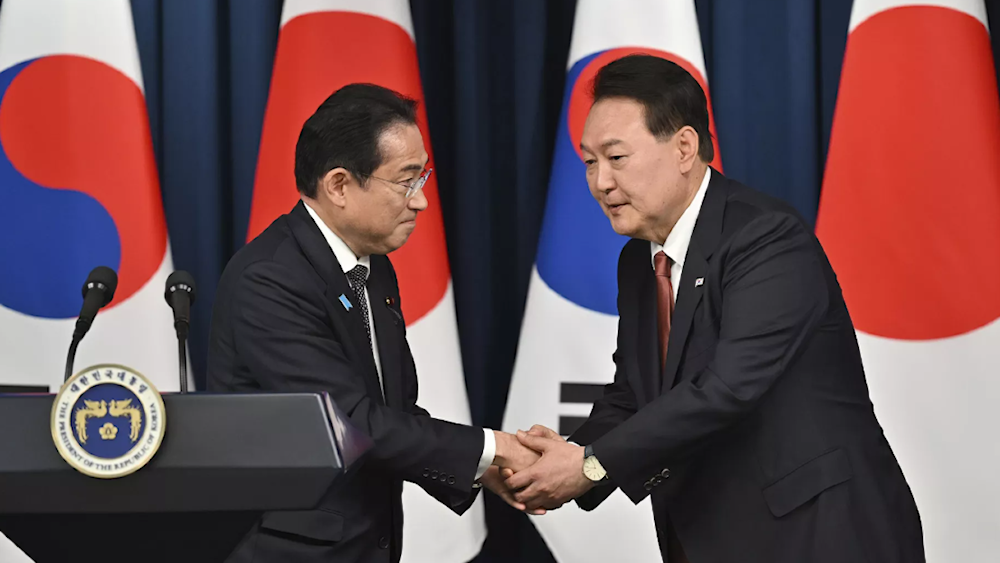Japan, South Korea agree to resume defense exchanges
The statement detailed that ministers agreed to "advance Japan-Republic of Korea-U.S. security cooperation and enhance mutual trust between the defense authorities while promoting cooperation and exchanges in various fields."
-

South Korean President Yoon Suk Yeol, right, shakes hands with Japanese Prime Minister Fumio Kishida during a joint press conference after their meeting at the presidential office in Seoul. (AP)
Japanese Defense Minister Minoru Kihara and his South Korean counterpart, Shin Won-sik, have agreed to restart defense cooperation following a 5.5-year suspension caused by a 2018 radar lock-on disagreement, the Japanese Foreign Ministry reported.
The ministry explained that "On June 1, DM Kihara and DM Shin confirmed that measures to prevent the recurrence of a pending issue between defense authorities had been formulated and concurred to ensure safety based on the measures if JMSDF and ROK Navy encounter in ordinary times," detailing that discussions took place on the sidelines of the International Institute for Strategic Studies Shangri-La Dialogue in Singapore.
The ministers also resolved to restart high-level defense talks between the two nations, which had been halted following the 2018 incident, according to the ministry.
In December 2018, Tokyo claimed that a South Korean Navy ship locked its fire-control radar on a Japan Maritime Self-Defense Force patrol aircraft. Japan filed a formal protest with South Korea over the incident, but Seoul disputed the charges and requested an explanation for the fact that a JMSDF jet "threatened" their vessel.
The statement detailed that ministers agreed to "advance Japan-Republic of Korea-U.S. security cooperation and enhance mutual trust between the defense authorities while promoting cooperation and exchanges in various fields."
Last week, the premiers of China and Japan arrived in Seoul for their first trilateral summit in five years, focusing primarily on economic issues rather than sensitive geopolitical matters.
The three leaders convened for a trilateral meeting, marking the first such encounter in half a decade. This hiatus was partly due to the pandemic and the long-strained relations between Seoul and Tokyo.
President Yoon, who assumed office in 2022, has aimed to mend historical grievances with Japan, its former colonizer. Before departing for Seoul, Kishida emphasized the changed regional and global landscapes since the last summit, calling the new meeting "highly significant."
"I would like to have an honest conversation with President Yoon Suk Yeol and Premier Li Qiang, and agree on working-level cooperation in a forward-looking manner," Kishida stated, expressing hopes for the meeting's success and a revival of three-way diplomacy.
According to Seoul's figures, Japan forced some 780,000 Koreans into labor, not including women forced into sexual servitude, during its colonial rule.
Survivor groups have long demanded direct payments and an apology from Japan, which insists that the matter is closed according to a 1965 treaty that restored relations. As part of the treaty, Japan provided $800 million in grants and cheap leans to South Korea as reparations.
But hopes for reviving the bilateral relations between Seoul and Tokyo and consequently the trilateral summit were boosted after South Korea said it plans to take money from major local companies that benefited from the 1965 treaty and use it to compensate victims.

 3 Min Read
3 Min Read








